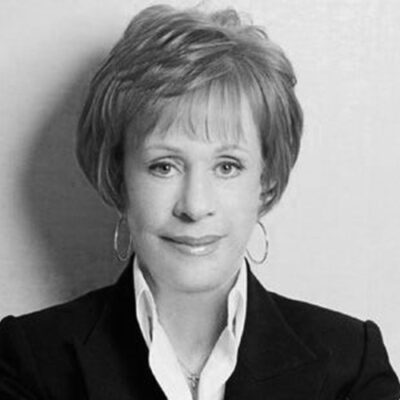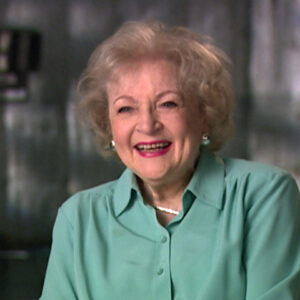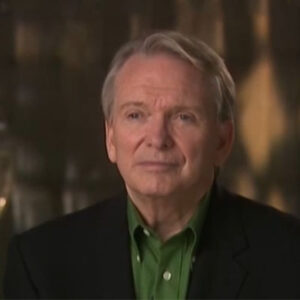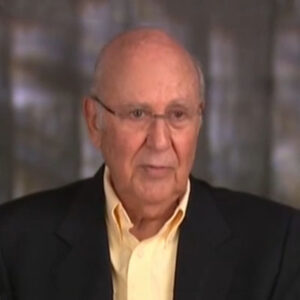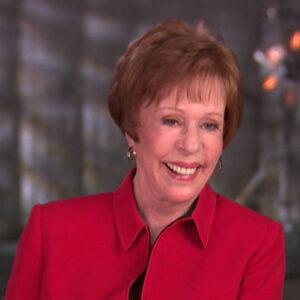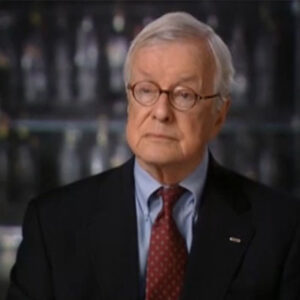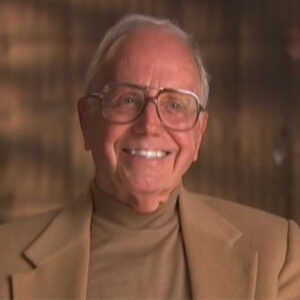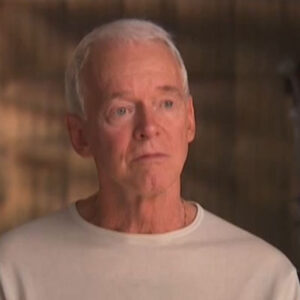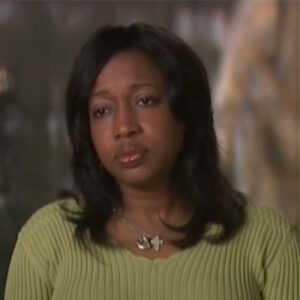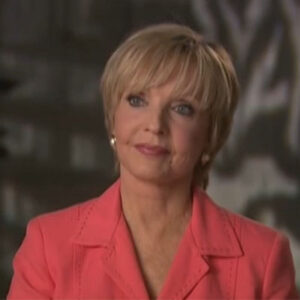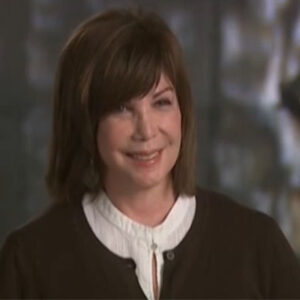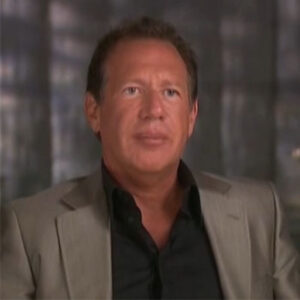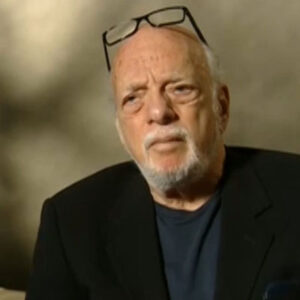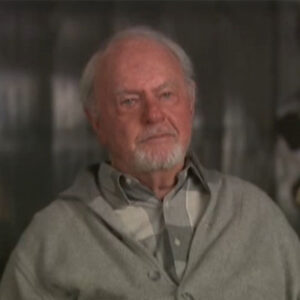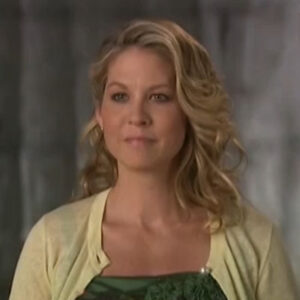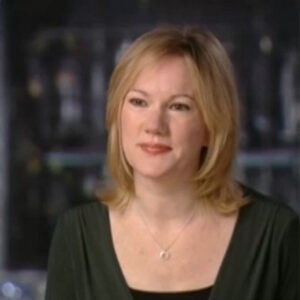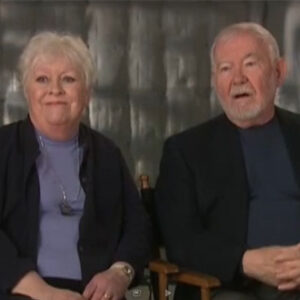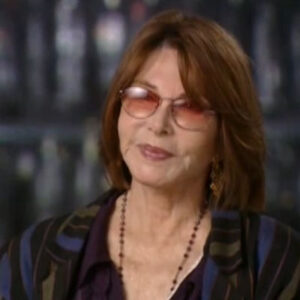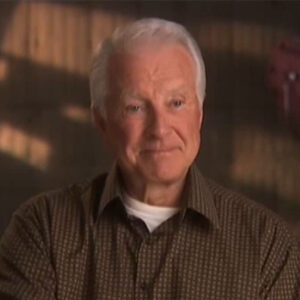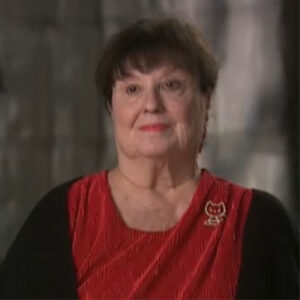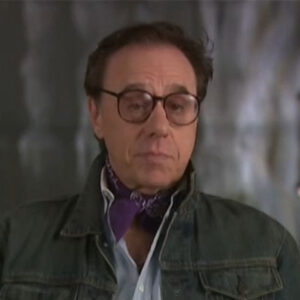Speaker I was so aware of Carol Burnett growing up because of the Gary show Tuesday nights at 10:00 and. Every Wednesday, everybody would talk about, did you see last night? Did you see last night? And ironically, I went to college and I met Gail parent and we started doing bits all the time. And her assignment was to direct Once upon a Mattress and I played Dauntless. So we were always Cabinet fans. And in fact, we went to the opening night of Fade Out Fade, in which this musical that Julie Stein and Betty and Adolph wrote. And years later we wrote a musical with Betty and Adolph and Joy for Carol Channing called Lorelai. But Carol Burnett was always somebody that you would talk about the next day around the water cooler, as they say. Did you see what she did? And she was just hilarious.
Speaker What was different about her? What was it? Was there something that was unique, especially for a woman performer?
Speaker She took no risks since she. She doesn’t like her performances that much on the Gary Mercer. She’ll tell you that she thinks she was too broad, but it wasn’t broad enough for us. We just thought she was a hilarious performer. And she is she’s she’s a she’s a funny actress. It’s they always do that thing. A comic and a comedian and a comic says funny things funny. And a comedian. Whereas I was going around, cut the first cut. What is it, the real one because it would always be good. A comic, a comic does things funny and a comedian says things funny.
Speaker It’s funny.
Speaker Okay, this is good. I love going to steal from you. A comic says funny things and a comedian does things funny. And Carol is both. You know, she’s a disarming person, too. She’s she’s never on offstage. She’s just charming and fun and open and a great comedy actress.
Speaker Your favorite sketches from the.
Speaker She used to always go. That was her cabernets catchphrase in the garam where she was always. That was wonderful. And that became a catchphrase for everyone. People like later Don Adams with. Do you believe it or. Sorry about that, Chief. You know, people would get or laugh and was sock it to me. Right. That was wonderful. She would. She wouldn’t do it on our show anymore. She really wanted to be less broad. And she got more satirical on our show.
Speaker So let’s let’s talk about how it evolved. First of all, Howard, how did you come to work with her? How did that come about?
Speaker So meaning Carol Burnett and getting The Carol Burnett Show was the big break in in my life and in jail, parents like we were writing for comedians. But that summer of 66, we wrote a comedy album called Our Wedding Album based on Lucy Baines Johnson’s wedding. LBJ, his daughter. And it’s really one of those terrific stories that Carol Burnett heard the album and said, let’s get those two kids. She hadn’t been on yet. She was going to be on the following September. And she picked us and we were the first writers sign. We were the junior kids, junior writers. And we came to California, in fact, two months early so we could work with the head writer Arnie Rosen and get trained in the art of variety shows.
Speaker What were you told about that? What was the assignment like? These are the kinds of things that worked these things down or what?
Speaker When we first came to California in April of 67, we were gonna go in there September. The show had departments and that always seems like a good idea. But in the end, it usually doesn’t work out to be anything you keep. Because departments happen normally, spontaneously, and when something’s funny and gets a big laugh. But there was a department called Carol and Sis, which was loosely based on Carol raising her daughter, raising her sister, Christine. We did. I’ll do that again. So it’s clean.
Speaker You mean then then I don’t have to start over. I’m not going to be funny in editing. I was starting this stuff, Eric.
Speaker When we came out to California, we were told by the head writer Arnie Rosen that there was going to be a department called Carol and CIS, which was loosely based on Carol raising her kids sister, Christine. And we were assigned for sketches of Carol and Sis. And I remember we laugh about it still today. They were like 28 pages long. We were writing, like plays. I mean, we didn’t know that it was a minute a page until that was the kind of thing you learned right away. And you found that were Catholic Avenue was when we got off the plane to New Yorkers. Well, we went to live near CBS and we were looking at apartments and Cadillac Avenue. And Bernie Brillstein, who became a famous manager, picked us up at the airport. He had just moved here. He got lost, taking us to the famous fabled Sunset Marquee where everybody used to say when they came in from New York.
Speaker What were some of those, Carol, and just sketches? Do you remember what a couple of the early ones were?
Speaker Carolyn says was was always funny because the blackouts were hard to find and it seemed to be the bit that Carol would just open the kitchen door and slam Harvey into the wall, into a potted palm, because we could never think of a blackout. Blackouts are the hardest things and sketches because by seven, eight minutes, you want to wrap it up. We did longer sketches on the show. If Carol was really involved and in love with an idea like the mini movie sketches, you know, the movie Take US. But Carolyn says.
Speaker That was interesting because as Venky got better and better, she would get more to do and then the stories would be more about her usually was Venky made an entrance. And she said, hi, I’m going to Marcia’s got to go. And she’d be out. And then the sketch would evolve about some situation between Carol and Harley. His name was Roger. Her name was Carol. You literally always use the first names of the character. She was Carol. He was Roger.
Speaker Yeah. Do you remember? Was that the test?
Speaker So Carol wanted a gorgeous announcer, and she found this guy, Lyle Waggoner. But she also wanted a great second banana. And she’d always said, why don’t we get someone like Harvey Korman? Because he had just done the Danny Kaye Show. And then Carol said, why don’t we get Harvey Korman? And the third was harder. That was she wanted to get somebody who plays sister. And she would get letters and pictures. And she once got a letter from a girl who was going to be in a high school play. And she went to see her out in Inglewood and the girl did look very much like Carol. And she was a durable, very raw. She was she was a singer. She was in the young Americans. And we did have a test for a girl named Heather and a girl named Vicky. And she just seemed like such a natural that it was easier to go for the more unpolished girl, the one who seemed real. And it didn’t hurt that she looked like Carol.
Speaker Do you remember what the network? Reaction was in those days, the networks would really leave you alone.
Speaker In fact, now they’re called the suits. Carol, to hear about the suits in those days, they never really left you alone because they hired the talent and they trusted the producer and they saw the show and they liked what they saw. Very rarely did we have problems. The censors were there, but they usually have their hands full with the Smothers Brothers across the hall. So we got away with a lot of stuff, especially in part political things. We would do these satires on the first family. They were usually campaign ads of the perfect family. Carol would say I’m forty four point three years old, the same year Martha Washington was. And she was first lady. And they were just these garish take us. And we had the obligatory black person come in and say, I’m the man, but I sleeps in the basement. And Harveyville, that’ll be Minerva. And there’ll be a cadet saluting who would go with the daughter. It was all very it was really funny satire. And that’s what Carol loved doing. That was a change for her.
Speaker Yeah, it’s interesting. I think most people would say there wasn’t really any political humor. Do you think it was just under the radar?
Speaker Well, we had. But in those days it was considered a lot of writers, too. We had about eight writers and there were the broad writers, the satirical writers, the the musical writers. And each writer brought their own spin to it. And Karen brazed more and she’d love a good satire. I mean, the first time we did Doris Day, for instance. We were really kind of salty and loud were pajama tops. And I have to do that again, because Chris, well, with a joke about. We would get away with a lot of murder then though, on Burnett especially, we did a sketch on Doris Day and it was hilarious. We just got all the essences of the Doris Day movies and all the way to Lyle wearing the pajama bottoms to Carol wearing pajamas tops and him proposing in one instant.
Speaker But what I was loved about, Carol, was she found those moments in between. I was thinking about telling you this. She would find those those pauses.
Speaker And fill them up in the Doris Day sketch. I remember telling her, I said, why don’t you put the tents or light right on your face? And in the middle, the sketch start to sing Chaos around Cerar, which they always do, and dance day moves that she would sneak a song in. And Carol really took her time. Another time in Lucy Baines take off. We didn’t write this. So this is where the writers have to give the performers credit, especially in a case like Carol Burnett. She found Hairspray on that vanity and she would punctuate the jokes with the hairspray, which I found so brilliant. It’s like with Tim and the novacaine shot and the dentist. We wrote that he would shoot his hand with novacaine and the rest. Suddenly he shot himself in the leg with a novacaine. Well, the rest of the sketch had Harvey in stitches and the audiences, you know, years later, they still show that sketch. But I love when performers find their own essences. And we were lucky with Carol Burnett because she would she would fill it for, you know, you came in with the talent.
Speaker I was gonna ask you what what she brought that wasn’t on the page, was it usually physical business or was it she wasn’t afraid of silence.
Speaker She wasn’t afraid of the silences. And she wasn’t afraid to let her body do its thing. And she she once said that she would love to leave her body to a prop shop as a skeleton. She still wanted to be on stage. She learned to really be loose with her body and let it go anywhere. And that’s why she has back problems, neck problems. She once fell on her ear. I mean, can you imagine here bragging? I’ve never heard of it.
Speaker But, you know, Tim and her were relentless in tracking physical books.
Speaker And again, with the writing, would you when you were writing physical business, would you write each thing she falls on your left leg like she falls or did you just sort of general and she.
Speaker That’s what’s so brilliant. You would write maybe 75 percent of the directions. But those other 25 came from heaven. And that they would do two shows. We would do a dress rehearsal and an air show and then the dress rehearsal. They would try things that they knew they could always drop or add, and they would do that all the time and then keep them for their show and cut the ones that didn’t work. Specific examples like the hairspray, when you saw her work, we were doing a Miss America interview and she had the orb and the crown and the crown started to slip by itself.
Speaker And she then started this thing and then she grabbed the orb and she started on the on the rim shot joke, starting to taurel it like a bad time. The timing was beautiful. She would just we didn’t tell her to do that. Who knew? You know, she would fill it with comedy genius.
Speaker And what was her role? I mean, this is me with the writers, tell me how she in the beginning, let’s start with.
Speaker OK.
Speaker And then she would fill these characters with genius, like we used to do a take off on Joan Crawford and of course we were shoulder pads.
Speaker Well, who would’ve thought in the middle of the sketch just she would adjust and start to pull it. And.
Speaker And she she she got her essences of doing those movie stars from her days being an usher in Hollywood. And she was her and her grandmother would go to the movies three times a day. And she filing was an usher at a movie theater, which they just recently named Put a Star. There’s a star in the Hollywood Boulevard right in front of the theater. They also gave her a door. They gave her her ushers door and to celebrate that. But Carol would get involved. The first time I remember Carol, getting very involved with the writers was in the movie sketches that we did. She announced to us early on that she was a huge movie fan, which we didn’t know from the Gary more days and stuff. But she had lived in Hollywood and grew up here and went to UCLA. And she loved Lana Turner. She loved Joan Crawford. And the first time she really got involved with the writers was she would insist on screening the films for us of Postman Always Rings Twice or African Queen or From Here to Eternity. And then we would go crazy and she would just she would love the movie sketch. That was when she was in a good mood when we were gonna do it from here to eternity, where she was Debra Carr and Steve Lawrence was was William Holden. And now I got that wrong. She would love sketches from movies where she could play Deborah Carr and Steve Lawrence could play blank again.
Speaker No, not when I’m home. Oh, okay.
Speaker Hi. Sure, I’ll do that again. Right. She loved the movie sketches like From Here to Eternity. She would smile when she knew she was gonna do it. Take off with Steve Lawrence, where she would play Deborah Carr and Steve would play Burt Lancaster frolicking on the beach. And of course, we pelted them with buckets of water. So they were trying to have a love scene in that famous ocean scene and we pelt them with water. Such a good sport never complained. The more the better, you know.
Speaker And what about was how would you would you ever communicate that?
Speaker Now, life became more difficult after we all left Carol Burnett because during Carol Burnett. She never complained. She would. There were shows where there was a sketch maybe that wasn’t working so much. But she never complained. And she went right through it and tried to give it its all. She she was never a diva, you know. Later on, when we all did a lot of specials in the 70s and 80s, there were a lot of star specials and a lot of singers would want to be funny like Carol Burnett and they would give you attitude. And course they didn’t fill up those gaps like Carol, you know, they thought it was easy. But of course, it isn’t. And Carol would never complain. She loved a great sketch like anyone and would laugh more than anyone. You can sometimes hear her. But Carol never broke up in the middle of sketches. Tim, of course, broke up, Harvey, and once in a while, Carol. But she didn’t like it.
Speaker She would stop tape or leave it in on very rare occasions. She didn’t like to go out of character and she became the character the minute those clothes went on her. Yeah, she found in the wigs and the clothes in the in the in the lines, of course. But she used it all.
Speaker Do you think she did. Did she find it? She thought it was unprofessional. Is that why she didn’t want to go out?
Speaker I think she’s an actress more than a comic, and she likes to stay in character and be the person and have. Have the fourth wall there. She she was a theater person. She majored in theater and UCLA and journalism. But she went to New York and she got her big break and once upon a mattress and her training was theater. And she then did theater a lot during the Bernet years, every summer. She would do a show sometimes with Rock Hudson. Sometimes she did. I do. I do with Rock Hudson and other shows all the time.
Speaker What was the. You were telling me on the phone? The relationship where Carrolls was in the writers room and how that played out.
Speaker Oh, yeah. Carol was such a good sport, too.
Speaker She did.
Speaker Let me let me do it again. I’ll do it fresh. Carol was such a good sport. And the funniest thing was in those early years, the first three or four years, she had to come in through the writers room to get to her dressing room. So being the nice person that she always was, she had to do that awful small talk as she would rush in to change like that said.
Speaker Okay. I think it’s going well. And never in a bad mood, you know. And she had to be nice. Even then, she couldn’t be private. Finally, when the show became successful, they gave her her own door and her own dresser. But, you know, she. She liked writers. She loved writers, but she didn’t hang out with the writers like later years, a lot of people did. She let the show run very much, nine to five. Her husband was the producer. She would be out of there at 5:00, have dinner with her kids at six. The only late night was Friday night. And then she was out by 9:00 and would take her guest star to Chasen’s. That was a tradition. And she she didn’t overanalyze. She did. She took her script home and learned the lines.
Speaker And what was the role with Joe between.
Speaker So Joe was the boss, he would hire two or three stars per show and there were about eight to 10 writers and we would know about two to three weeks ahead who was booked. So it became, OK, who wants to write the Rita Hayworth sketch? I do. I do. With Hayworth. You know, these people that were on the show, Ethel Merman and Maggie Smith and Lana Turner and Gloria’s Swanson, like movie stars. Besides, the TV names would excite a source. So we would write two weeks ahead and she would get the pages and she would give Joe her input and sometimes the head writer, but very rarely would she come into the writers office and punch it up. She expected that to be done and any punch up was done after the Wednesday run through. So it was a very orderly schedule. Monday was the reading. Tuesday was the rehearsal. Wednesday was rehearsal. And then late in the day, a run through already. They all had to learn their lines.
Speaker Thursday they were in this studio blocking and Friday dress in air. So it was a really. Tightly run ship. You know, she deferred to Joe.
Speaker What was Lyle Waggoner’s?
Speaker Lyle Waggoner was an interesting thought because he was there from the beginning, because Carol coming off her, Gary, more days and the broader comedy wanted to swoon at a gorgeous actor who would be an also an M.C.. But like Vicky, as the years went on, Lyle was very good in sketches and had a very good sense of humor. He was particularly hilarious in the love story sketch where he was the doctor setting out the instruments on the bed one at a time. Then he took one look at her open wide. She went, Oh. And then he packed the instruments back up to where he was really good. In the beginning, he was there for just distraction, swooning purposes, which she then hated. She hated swooning over LA as she became a woman.
Speaker We’ll talk more about that because it was her idea initially. Do you think that she was comfortable sort of playing that role early on? And then what was happening with. She’s changing it.
Speaker You know, it’s funny when I think about Carol. Age wise, I think she was like in her late 20s when she started Gary Moore, and she was already on the air when she was 33, 34 on our show, The Burnett Show. So at 34, maybe you still swoon at guys. That’s why Lyle Waggoner was cast. Maybe you fall down a little more as the years went on, she got a little more sophisticated. She wasn’t a woman’s libber, as it was called in those days. But she was conscious of what a woman should do. And she didn’t like swooning and she didn’t like the drops anymore. And she matured as the show matured. I mean, to think how many 34 year olds do we know who have their own show for 11 years? You know, she really grew up in front of America, didn’t she?
Speaker And. So do you do you think that that comedy was changing, though, in general at that time? I mean, where are we going from?
Speaker We were almost the golden age of Telles. I think the golden age of television isn’t. When we were on the golden age of television as the 50s and 60s. But we did have a lot of variety shows on the air. Then our studios at CBS were full of the Smothers Brothers, Sonny and Cher, Sonny, Cher, Sharon son.
Speaker There were so many Sonny and Cher, says Glen Campbell. Red Skelton was next door to us. And Judy Garland had been in the studio that we were in a couple of years before. And then Jim Nabors had a show, Tony Orlando and Dawn had a show. I know I’m missing some, but that was another age of comedy. And I think the Smothers Brothers gave us all and laugh and to a little more freedom to get political. I don’t think in the early days of the 60s, they were doing as much of political stuff. And I think Gail and I got our start writing comedy album on the Johnsons and Van Meter had preceded us with the Kennedy. So I think you were allowed to do comedy about.
Speaker The first family, much more than you were earlier than that.
Speaker Now, today, please. They’re just funny on their cell. You can’t beat the real thing. You watch the news, right?
Speaker But I mean, it is interesting because, for example, during the 70s, obviously, Vietnam was. Raging on, and I don’t believe that I recall that. But that was ever sort of touched on. Tell me some of that.
Speaker Yeah, sacred cows, I think the Burnetts stayed away from. By the way, the sacred cows, the right phrase, what am I trying to say? Like Vietnam is that sacred cow.
Speaker The writer can’t think of what the phrase. What do they call me? Let me do it way. Taboo subjects were usually left to the Smothers. We would sneak a few in. We would get political and doing these paid commercials, Takeoff’s or Carolwood once in a while. Do Lucy Baines or the First Lady. But we wouldn’t go ahead on that. That was forbidden territory.
Speaker Why do I think we saw that the Smothers Brothers were having so much trouble?
Speaker And it also isn’t Carol’s point of view. Carol isn’t very political, but she’s she’s. Let me say that better. Carol’s political. But she likes to keep her politics to herself and not be an ad for one side or the other. And so we didn’t we didn’t, you know, hit Nixon during the Vietnam War or Johnson as much as maybe go around them a little by doing, you know, their daughters was an easier way to do them.
Speaker Do you think the show was reflective of the times?
Speaker I think that she’s also didn’t want to advertise women’s liberation. There were times I remember when Cass Elliott was on and Cass and Carol and Vicki sang a Joni Mitchell song, which was had a political vibe to it.
Speaker And suddenly we got political by showing waste dumps and and excesses in the environment. And that was the most we would dare. We would usually stay away from it.
Speaker And in terms of the sketches that you did, you see her? I mean, I feel like in the beginning, a lot of those early sketches, she played a lot of housewives sewer, you know.
Speaker Yeah. And you saw less of that sort of last time when.
Speaker I remember as as the show was getting successful, Carol did take some risks about content. I remember one sketch that was hilarious. It was about a woman who had just lost her husband that day and the news trucks came out to interview her and she was a bereaved widow. And then suddenly, let’s take that again. She would say, I didn’t feel it. Let’s do another take. And one of many say he fell off the building rather than slipped. So it was the takeoff on Dateline and and those kind of shows before they were even around. So Carol had a savvy sense of what would be topical and what wouldn’t be.
Speaker The sketches that you wrote, can you tell me some of your favorites so you can bleed into sketches like that?
Speaker Is that what you’re doing? Should I do cues like that? Perfect. That was a historical sketch where you do remember it all just beyond hilarious. Let’s take that again. Wrap it up. We all. OK, some of the favorite assignments that that we would all go for were were when they were stars coming on the show. I mean, I couldn’t believe Rita Hayworth was coming on the show. And we wanted to write the Rita Hayworth sketch, which was very funny sketch that took place in the Brown Derby where Carroll was playing tourist with her daughter and she had the home camera, the movie camera. And in walks, of course, Rita Hayworth and Carol would not leave her alone and read it was trying to be nice as herself, but finally said, I really need some private time here and I’ll never get Carol’s line. Listen, Rita, we all want to get out of here.
Speaker I just see your bank go into that, right? I just watched that.
Speaker Writing for movie stars was so much fun. Gloria Swanson. Lana Turner. I’ve said that before. That’s a bore. I thought you could lead into whiskey.
Speaker How was Carol? Were her euros?
Speaker Carol was a fan and still is a fan, and she loved the movie stars she loved, as I did when Ethel Merman came on and she particularly got a kick when I saw from him, she knew I loved her. And we went to the Wednesday run-Through and all that. Ethel Merman, you could see it was cue cards in front of her. She decided to sing Glen Campbell’s Gentle on My Mind. And Carol got hysterical because I couldn’t see Ethel. After all these years of wanting to see her, you know. And Carol greeted the guests and treated the guests like they were people at her home. She took them out Friday nights. She would do anything. She’d never won an unhappy guest. She got furious once when a guest was insulted or read the riot act by a guest or a crew member. It didn’t really happen much, but there were occasions and she couldn’t stand that she couldn’t stand. This set, the set was a reflection of her happy. The crew laughed. She wanted to be a smooth ship. She wanted to run the show like a theater piece. Live audience. No stops. And I really mean no stops. We would do those mini movie sketches and we would have the sense. We would pause once in a while, but rarely. Rarely. She liked the feeling of a live show. She got that, I think, from her love of the Sid Caesar show and The Garry Moore Show. A live audience doing sketches in a theater, as they did in New York. So we turned Studio 33 into a theater.
Speaker There was another one, I think Gail parent and I wrote a sketch called As the Stomach Turns, which was gonna be a one shot sketch about what happens when you wrap up a long running successful soap opera.
Speaker And the guests in that were Betty Grable. Martha Raye.
Speaker Well, I mean, again, movie stars doing. And Carol, I remember, ran into the Gail parent and I wrote a sketch called As the Stomach Turns. And it was a takeoff on soap operas and how to wrap one up that’s been running for over 20 years. And in it was Betty Grable and Martha Raye. And I remember Carol being so excited, she had a dressing room right next to the writers room and she had to run through the writers room to get to address you. And I remember her looking at me saying, we’ll do this again. We’ll make this a department. And that’s how a department happens on a variety show. Not you can’t preplan a department that much. It usually just happens. And most of them happened out of very successful sketches.
Speaker So, yes, she is seen as she watches General Hospital. She was a soap opera fan anyway. So that became a wonderful department for guest stars. You know, I remember Nancy Wilson was on one and she opened the door, Carol. And Nancy was dressed in widow weeds. And she had said, let me do that again, because this is a funny story.
Speaker I remember the Department of Kilometre to get. As the stomach turns became a perfect department for guest stars.
Speaker And I remember Nancy Wilson once. She can win, everyone in the town was a widow. That episode, everyone was a widow and Carol opened the door after the Ding-Dong. And there’s Nancy all dressed in widow’s weeds. And Carol Adlard Hoe, a black widow. And it just convulsed the audience. Now, that’s an interesting point. She wouldn’t have lived that much, Carol. But she knew when there was a good one, she would work. At the moment, the moment in hand, which is what a great actress does, and she used that spot, namely to ad lib once in a while, not like Tim, who went totally crazy and convulsed Harvey and the rest of the crew. But Carol stuck to the script more. But once in a while, she’d thrown in Adelaide.
Speaker Just mentioning.
Speaker And it was an important part, I think, hiring Gail parent. It was an interesting choice for Carol because there weren’t that many women comedy roles. There had been Lucille Cowan and some a dime and Trevor Silverman. And I think Carol unconsciously thought it was a good idea. I don’t think she went out to do it to make a point.
Speaker That’s what she’s like as a person. Things happen kind of spontaneously. But I think it was a good idea. And she loved that. And in later years, she hired a lot of women.
Speaker She hired.
Speaker What’s the name? Let’s get them ranjani with me and I’ll do it. And there was another girl.
Speaker All right, I’ll just say, gentlemen, man. And I know over the years, Carol hired a lot of female writers, Jenna McMann, who helped create the family, which Carol loved doing, and. I’m probably leaning out names.
Speaker But did you at the time? How unusual was it that it was a woman fronting a variety show, I mean, did you think that it seemed groundbreaking?
Speaker Galen, I just graduated NYU and we we did this album on Lucy Baines Johnson and Fannie Flagg played Lady Bird and she she ended up making a career out of doing Lady Bird. But we were very used to writing for women.
Speaker We had written for Lily Tomlin and Madeline Kahn at the upstairs of the downstairs, which was the review in New York. And we were always writing first thing Gail and I ever wrote was a Miss America sketch. And it was in this review in New York. And then we wrote a movie on Miss America From Birth to Miss America. A born with a little pageboy fluff. And we were used to writing for women. So it wasn’t that shocking to write for Carole.
Speaker But in looking at it in terms of.
Speaker Was it groundbreaking when things when you look back at things and they say groundbreaking in a hit? It didn’t seem like groundbreaking or a big hit. Then it seemed like a job. We were so spoiled because we had this weekly job. We would have summers off. That’s when they used to put Summers shows in, which was another whole aspect of television to remember those.
Speaker We had a great and it seemed very normal. I don’t even remember the show as being a huge hit. I think it was in the top 20 or 30. I didn’t think it was in the top 10. I think when it became that Saturday night on the family, Mary Tyler Moore, Bob Newhart thing, it was always successful. But no, I don’t remember. It is groundbreaking. I think when you’re doing the work, you’re so involved with the work, you don’t think of it at the time as groundbreaking.
Speaker Do you remember that first episode? And did people think, well, we’ve got something here? Get on the air.
Speaker The first episode we ever taped proves that you don’t have to do departments because I remember clearly there was an opening. No, a big production number. I love Gary Moore. It was a Brazil 66 song and it was okay, but it seemed kind of typical. And suddenly, Carol, in between shows in her bathrobe, warmed up the audience and started to ask them questions.
Speaker They’d start ask her questions. And Bob Banner was the executive producer then said, you know, that’s a better opening for the show. Don’t have this production number. It seems so rote. Get rid of the dancers and all that and just have Carol come out. And indeed, in the first couple of shows, she came out in a bathrobe and she did questions and answers. And it became, of course, the staple that America, I think, fell in love with her because of the directness and spontaneity. And it was also a fabulous showcase for Bob Mackie to give her a gorgeous gown every week. But that happened spontaneously.
Speaker The departments that you have in the beginning of a show, I think we had one called VIP and it was going to be on a VIP that week. It was famous. That lasted about three weeks until we lost. You know, they don’t usually last Carolyn since last, but they usually happen spontaneously. Departments like as the stomach turns, the old folks, Mrs. Wiggins, that was just a one time only. And Carole fell in love with the character, as did Tim.
Speaker So.
Speaker Repeating that whole chunk about departments all the time. I know, but it’s good, isn’t it, to get better? I’m trying to remember that. Tell me about.
Speaker We talked a little bit about Lyle Waggoner. But what what how did his why did he leave? What was. At what point did you leave and why?
Speaker I know he left. Today. After about seven years.
Speaker La Wagener was interesting because he didn’t last the entire 11 years. I think he decided he’d had enough and you know, the little women to inventing the Wagoneer, the the dressing room for stars and became a millionaire from that.
Speaker I think he was always focused on business. He had a loyal fan club that he would sit and write letters to. He would sell Lyle Waggoner buttons, La Wagener T-shirts. And I think he was frustrated that he didn’t do more sketches because he really was funny. So he didn’t last the entire level.
Speaker And I think Harvey left after the 10th and was replaced by Dick Van Dyke, but it was a natural fade out.
Speaker You know, what was the story behind Harvey? It’s almost going to leave for you.
Speaker I think Kav is leaving wasn’t a big dramatic problem. It wasn’t a fight or anything. I think he just simply got tired of the swarm and wanted to go on to other things, which he did and went into doing Mel Brooks movies and things like that. But when we tried to recreate Carolyn Harvey, we’ve done several reunion specials. It doesn’t seem that they’re comfortable and in fact, they weren’t. So we didn’t do them doing sketches again, because Harvey even more than Carol thought they couldn’t top themselves. So we ended up doing all clips, which went on to become very successful shows that we had written. And in fact, the sets were up for sketches and then those sets came right down. I remember saying that one of the writers, Buzz Cohen O’Carroll, would never cut as the stomach turns. Never as I was saying that those stagehands were taking those moldings out. Let me grab in the candelabras. And I remember saying to us, I still don’t think so. I couldn’t resist the moment.
Speaker But Harvey felt he couldn’t top himself anymore, and he convinced Carol to that, too. Now, there’s not a day that goes by that I don’t think about Carol doing some character that’s on the front pages. I mean, Paracel, I don’t know who you know, but it was time to to get maybe out of the clothes and drop the wigs and. Do other things in life, which she certainly has.
Speaker Funny, Bob Mackie.
Speaker He did. There’s so many things that we would do.
Speaker What was the mood of the.
Speaker This is a nice land thing that might be good. I. The great thing about doing The Carol Burnett Show is you could read in the papers about a funny thing that happened or a funny personality. And the next thing you know, you’re writing it. And then 10 days later, it’s on the air. So you could become very topical. So rather than maybe political, we were topical. She would love doing commercial takeoffs and we did them constantly. That was a very good chunk and a department because they weren’t they were very satirical. So we could use real life all the time.
Speaker It’s interesting because I don’t necessarily think of the show as being topical. But you’re right.
Speaker I mean, the commercials one, there were commercial take us there were movie spoofs. People in the news, we we would be more topical than you would think, you know, because people just didn’t expect us to be as topical as that was the week that was or Saturday.
Speaker And lives actually started a few years after us. And they were more topical, as were the Smothers Brothers. But we snuck them in.
Speaker What was the let’s see that the first special that.
Speaker Carol did a lot of specials before she did her own show. But I think the first special she did after getting The Burnett Show was a special with Beverly Sills. She had done those stream specials with Julie Andrews. She thinks she did two or three of them.
Speaker And it was just such a natural to do Susan Burnett at the Met. There we were. What a thrill at the New York meant. Finding out the Beverly Sills was a very funny person. And this might be interesting for you to know about a writer’s job. We sat down at the reading on a Monday for the special same schedule. And Carol could sense that Beverly was uncomfortable with the sketch.
Speaker And.
Speaker She didn’t want her to do it if she wasn’t comfortable. But we needed a sketch. So Joe and Carol turned to us and said, do you think you can read a sketch today?
Speaker And you have to keep in mind that we had it, we had to think about the sets and the costumes, which almost helped because. Gail, I said to each other, why do we think of something on a bare stage? What about using the Met as an audition place? And it was just the same year as Chorus Line. And I said, why do we do an audition scene for an opera star? And Carol should be vying with Beverly Sills. So we made Carol a very jazzy kind of actress who was definitely having an affair with the director. And we made Beverly the schlump with the voice and the take alone of Carol onstage with Beverly after Beverly does the scales is in the special, and it’s just remarkable. So sometimes you get into situations where you have to do not just a rewrite, a whole new sketch, and that happened on that show.
Speaker What about her ability as a singer? I mean, it’s pretty. You know, she has said that she was never really felt that singing she was. Beverly Sills. How does she feel about that?
Speaker The Burnett Show was truly a variety show in that there was singing, there was dancing, there were sketches. The singing was remarkable because we would have Ella Fitzgerald on.
Speaker We would have Lena Horne on. We would have specials with Beverly Sills. We had Marilyn Horn and Eileen Farrell and Carol do the three little pigs as an opera on the show. And Peggy Lee and of course, any grown man, Carole, would many times sing. And Carol underestimates her singing talent. It’s it’s ferocious and big and warm. And she even did a few albums during that. She used to sing with Martha Raye on the show. They did an album together. And of course, all the musical specials, we even did one with Placita Domingo. And that was fun because that got her a chance to do a brilliant sketch written by Ken and Mitzie Welch, an all musical version of Alger’s with Placita was the Jewel Thief. And Carol is the rich heiress. And they use all Cole Porter songs. And it was this 20 minute long sketch directed by Marnie percent that never stopped. And it went from the car’s bottom, a hotel room to the docks. And she was hilarious in it. She would never dine. And they kept shooting her at the end. But all the bullets ricocheted off her diamonds.
Speaker But really, it’s true when you think I mean, she obviously her voice is not an enough operatic voice, just like, you know. But but she she could she could keep up with. I mean, she should her being paired with Beverly Sills or Julie Andrews, some of the best voices. The world was not beyond her, right?
Speaker Carol had been a musical comedy performer even in college. She did know Annie in Oklahoma. And when she went to New York, she lived at the rehearsal club. And they would put on shows all the time. She always sang. And then she got her big break. And Once upon a Mattress, where she auditioned for George Abbott and she got the part. And she she always belted. She was a Broadway belter. And she did another musical after that. And she’s done musicals ever since. But her voice goes to the very top of the balcony. And in those days, she didn’t need that amplification. They all have now. She was in the merman fashion. So when we did our show, it was a good chance for her to sing with anyone she wanted to.
Speaker From the likes of Ella Fitzgerald to Lucy Ingram Mae to Marilyn Horne and Eileen Farrah, where they did a mini opera of the three little pigs. And finally, Beverly Sills at the Met. So she sang with the best of them.
Speaker Later on, wasn’t there was a limited series in.
Speaker Is that right? Can you talk about that? It was like a four. Oh, yeah.
Speaker Years later, after we went off the air.
Speaker We did some summer shows in the vein of the old Burnett Show. But then somebody pitched an idea about what? About doing sketches again. But in a different form, not singing, not dancing, not dancers and singers. Just the little ensemble where they would do anthologies and. That was very difficult because they were like little playlets. That was the goal to do two or three playlets. And there you really do need a beginning, middle and an end for them to really land because you’re you’re competing with theater then. And that was hard getting the material. And the network was giving her a very hard time because while they wanted something different, they still wanted the same thing from Carol, which were the big laughs. But you don’t get as many big laughs with plays in that time span. And that was a tough time for her. And I didn’t think the atmosphere on those shows was this fun for her as it was on our show. I think the writers were giving her problems and saying things like, well, don’t be so Carol Burnett. Well, why did they hire Carol Burnett? The.
Speaker Was it a critical success at all?
Speaker I don’t think it was a critical success because I think it was sort of a neither here nor there verdict from the critics and the public. They’d rather watch the reruns of our show, which were on all the time and I think still around. But that’s how some kids now know, Carol, from the reruns.
Speaker Was that also a difficult time for him? And right after The Carol Burnett Show finished. Personally as well, yeah.
Speaker After The Burnett Show finished, which was about 78, 79. It was a new time for her. She did drama on television. She did friendly fire. She did Pete until she with Walter Matthau and she was doing movies. She inched a little bit to do sketches. And so we would do a summer show one season where there were four shows. And then she. She was going through some marital problems then and after she broke up with Joe, who had been her producer beside her husband, she worked with some new producers with new ideas, and they didn’t always go that well. She did an anthology show that she fought with the writers and the network because while they wanted Carol Burnett, they said they didn’t want Carol Burnett and she was cabinet. So she was confused.
Speaker But was it a period of growth in a way that was sort of becoming more.
Speaker I mean, she didn’t have. Yeah, that’s true, too.
Speaker And after Joe, she took more control of her career. She had the ideas of what she wanted to do. She didn’t even want to go near another variety show that was going to be compared to the old Burnett Show. That’s probably why she embraced the anthology series, which had its woes, too. But she’s always trying something new, Carol. And she did a lot of movies during that time, too, and a lot of musical specials we did with Placita Domingo. And she did some with Ken and Mitzi Welsh with them other stars, Tracey Ullman, she did mattress with. She took an interest in producing mattress as well as appearing in it as the queen. So there she was back doing mantra’s after all those years.
Speaker And let’s talk about Plaza Suite. That was another. Oh, yes. What was the. How did that how did that come about and why did she.
Speaker It’s the perp. Let me try to think of a way to get in order personally. Carolyn, I stayed friends all these years. There’s not a week that goes by that we don’t talk. And especially after she was divorced, we would speak more because we were two single people now. And I remember one night we were talking about, hey, what about doing Plaza Suite? And we both loved Plaza Suite and we said, oh, that would be fun because you could play all three women, but we could get three male stars. We got all jazzed up about it. And don’t you know that we strutted into ABC? And it must been 10 minutes in in the office. And we sold that show and we got Richard Crenna and Dabney Coleman and how Holbrook and Carol said this is the kind of person she is. Kenny, why don’t you direct. You’ve never directed. And I said, little man. And the next thing I knew there, I was directing, which was another story that could be on my anthology, that could be on my American Masters thing. Carol was supportive when I was directing. And once again, I saw the old Carol whip into shape because she had nine million ideas. And she helped me so much because she would say one Jim, come in from there, because there were moments where I was just like put on the spot, like, who wants to be here? It’s much more fun in the writers room. So I really take my hat off to directors because they have the patience to work with actors and to spend those long hours in the rehearsal hall. Well, I want to be in lunchroom.
Speaker Well, what happened?
Speaker So Plaza Suite was fun. I’ll never forget what happened when we finally aired. My father never let me forget. This other show went on and we went through the first and we went through middle of the second play. There was a bulletin Iraq struck. What? There was a warble, Iraq struck bombs. And there was this whole big news report. And then they came back and instead of continuing where we were in the show, they just went back to the time frame. So they were already midway into the third act. So nobody knew what was going on. We were never rerun. My father never gave up hope that it would be rerun if we didn’t get a good break with Plaza Suite. But who would with which do you think’s worse, though? Iraq or that?
Speaker It’s never been seen.
Speaker Now it’s never been seen.
Speaker What about Hollywood arms, if you could talk a little bit? That was.
Speaker When Carol was divorced, she also wrote her life story and it was an interesting life story because she lived just two blocks from here in the middle of Hollywood, a kid from Texas who grew up with her mother and grandmother and kids sister in one of those ramshackle Hollywood apartments that years later, Carol visited. And not only did she visit it when the people moved, she rented it and she rented it and redid it. And she used it as a catharsis to write this play called Hollywood Arms, which was about her childhood. And coincidentally, I was very friendly with and still am how Prince, who was friendly with Carol and he loved the idea. So he guided her through this play. And sure enough, Carrie Hamilton and Carol wrote it together and it was beyond the bonding experience for them and a great way for Carol to express. Everything she felt there in Hollywood. She rented that apartment, can you believe it? And she gave her cousin all the furniture when she left.
Speaker Were you there for the opening night?
Speaker I say it was a one room apartment. I said to.
Speaker Oh, so we’re going to do that again. It I’m sick and say one rumors that, ah, it was.
Speaker And so Hollywood arms was conceived in the same apartment that she grew up in. She actually rented the apartment and used it as a stimuli to write it. And Carrie Hamilton, her daughter, joined her in the process. And that was a major bonding experience. And the whole experience with getting the play done coincided with the sickness of Carrie and Carol and Carrie meeting with how Prince. And him directing it on Broadway. And there we all were on opening night in Chicago. But there was no Carrie. So it was a very tough time because the play was about, Carol, the experience of writing. The play was about Carol and Carrie and talk about emotional upheaval. She handled it graciously and beautifully. She does everything.
Speaker How do you think the work was kind of a refuge for her in a way after that or.
Speaker Yeah, that’s a good subject, isn’t. I think with the death of Carrie. Needless to say, her.
Speaker Just. In doing projects and stuff like that was way on the back burner. And to this day, I don’t think you ever get over that kind of loss. But she fills her life with now husband, a new house, friends, and setting up a very important thing with a friend of mine, Martha Jameson. This Carrie Hamill lab, which is going to be at the passage in the playoffs, and that’s going to be an experimental site for theater experiences, which is something Carrie always loved. So she’s very much into keeping Carrie’s memory alive.
Speaker And she was able to work with Kerry on some other things as well. They were able to act together.
Speaker I didn’t know.
Speaker Remember that touching the mike armor, carrying her, bonded through that experience. And I actually wrote an episode of Touched by an Angel for Carol and Carrie and that that whole experience meant so much to the people. It touched by an angel that they were instrumental in getting the passage in the playoffs to name a theater after Carrie. Martha Williamson was the producer and she rallied to get the money for it. And right now, it is a lab for theater experiences. So Carrie’s memory is kept alive.
Speaker Touched by an angel was a spiritual kind of trip for them, too, in that they were playing mother and daughter. Madam Rose and her daughter Gypsy. But in this case, it was a backstage story with Rita Moreno, where they had been stars at one time together. And it was a little bit like Follies. They were revisiting their their youth. But Carrie was the essence of her youth. She was getting her starring role in a Broadway show.
Speaker And I mean, what why was it so meaningful for them to be able to do this together? What have they been through?
Speaker Violence. And of course, the irony of Carrie and Carol was that they had such a even a publicized relationship over the years. Carrie had some drug abuse problems over the years. And and Carol and Carrie championed these. Clinics and these ways to to stop drug abuse and very up front about it. They bonded and then. But like any mother and daughter, there were there were rough times. You know, she didn’t like all her boyfriend’s should didn’t like all her husbands. And but they always got together and they would use a chance to perform, like doing Touched by an angel together to bond and then taking it all the way with the writing experience. They they had other projects in mind to really write, too. They were gonna write diaries together. My view. My view. Things like that.
Speaker You mentioned that they championed various causes to do with, you know, rehabilitation and that sort of thing. What, Carol is a very private person. We’ve heard from everybody. And yet she has been very public with a lot of some of the most personal things in her life.
Speaker And I just find that.
Speaker I mean, telling your life story as a kid, going public with her daughter’s addictions and so forth, and I’m just wondering, you know, criticism carries a strange mix of the personal and the public when she feels she’s been violated. She doesn’t have a problem with going public. Years and years and years ago, she sued the National Enquirer and she was the first celebrity to sue and win over a charge that she was drunk in a Washington restaurant. And that was so ridiculous and sensitive to Carol because her family had been alcoholics. And it’s been a touchy subject for her, as has been her rocky road with her late daughter, Carrie. There was a drug dependency and they went public on all the talk shows by introducing various drug programs and how they affected Carrie and how they contributed to her rehabilitation. So she’ll go public when she thinks she has to, but she doesn’t like to wear her feelings on my sleeve too much.
Speaker Those hard decisions.
Speaker Yeah, all of those decisions to go public on what private demons were happening in her and her life were hard to make because she’s essentially shy. And she she had trouble making the decision to go public. But when she really thought she was going to help people and, you know, give them the chance to make their lives better. She did it without being.
Speaker When you saw Hollywood arms and read her book and so forth. How much of that was a surprise to me? How much of her background had she shed?
Speaker She had shared a lot with me, but I was a personal friend about her youth. She took me to Yuka and Wilcox. A lot of times we would go screw’s by the neighborhood. This is years before she ran out of the apartment. Yes, that’s right. She rented the apartment. She rented it to become stimulated about her past while she was writing a book and writing the play Hollywood Arms. I was aware, but I don’t think even in the first book one more time, she wrote as she didn’t open up everything that she could have because she keeps a distance. She does keep a distance as a person. She’s shy. It’s funny that she sang the song Shy. And Once upon a Mattress. But she really is shy and very polite. She’s she’s a Texan girl. You know, she might have had very big problems with her mother, father and grandmother, but they taught her the right moral codes. And she stuck by them. You’ll never hear a bad things said about Carol Burnett.
Speaker That’s very true. What about you? Is that she was taught the right moral codes, a lot of that came from Nanny.
Speaker So I should go into the Christian Science. Yeah. Did did did you. No. Did you ever meet Nanny? And what did you know about her?
Speaker Carol used to talk about her nanny all the time, and the big thing that was a big part of Carol’s growing up was that her grandmother was a very, very fervent Christian Scientist, which she reflects in Hollywood arms. And while Carol was never a Christian scientist, she was very spiritual, like her grandmother and not as much about going to church. But in just the right moral code of living. For instance, she won’t hate me for saying this, Carol would never smoke in public. She was a sneaky smoker. She’d hate me for saying that, but that says a lot, doesn’t it? You know, you don’t want to do it in front of your family. You know, knew in front of your kids, you know, I wouldn’t do it in front of your friend. She was not. Comfortable smoke. That says a lot about her. Her moral standards. She doesn’t smoke now at all.
Speaker But if sense of privacy. Should be thrilled, in a sense.
Speaker Is it even relevant? Well, the moral stuff’s good, though, isn’t she? Southern Baptist and Christian Scientist.
Speaker So that speaks a lot about her moral fiber, I would say.
Speaker What do you think? Just looking back over her career, what is what is the most unique thing about.
Speaker What sets her apart? Why are we doing it?
Speaker Carol Burnett is the every man in all of us. She’s the kid we all went to school with. She was the the the kid that maybe didn’t date so much, but always had millions of friends and always was doing bits and ending The Nutcracker friends and family up. She shared that with the public over the years. There were no bars, there were no holdbacks, you know, she kept her private life private, but she gave of herself to the public by showing the funny parts in all of us.
Speaker And that was.
Speaker We all felt like we could root for her because, you know, Ashton, so we could always root for Carol Burnett because she was one of us. She was the everyman. She was the kid in school. We when we grew up with. She was the kid in school we grew up with. She was the kid in school that we laughed about and we might have picked on who might have picked on us. She was all of those things and she conjures them all up in her characters. And that’s what’s so thrilling to write for her, because you can write about any kind of character and know that Carol could identify with it.
Speaker Really? I got I’m saying these things, these sound both.
Speaker Did you want to say that first about.
Speaker I think an element of Carol to remember is that she’s not combat of or argumentative. That might be a reason that she didn’t in Iraq as much with writers in the early years as I know she did in the later years when she was trying those anthology shows. But when she would go head to head with those writers, she had a tough time because it’s not her nature. And it was almost like, I’m doing the best I can. You know?
Speaker And another thing we were just mentioning about her, something her part of her appeal was her ability to laugh at herself. I mean, we weren’t laughing at her, right. We did believe that she was able to sort of bring us in to laugh.
Speaker I think what Americans fell in love with, with what let me doing it. I think what America fell in love with. Was the everyman quality of Carol Burnett, the ability to laugh at herself from the earliest age, from the worst kind of. People would think of as the worst kind of experiences. But she she describes her her family life as happy and funny because there was love. And I think she identifies. People identify with her because ISIS is so going so well, wasn’t it?
Speaker No. Let me do it again. I tried to do a good, clean sweep because I knew what it’s like in an editing room. Why is he oh, he starts off GERB. And then my father used to say, I can’t understand what you’re saying.
Speaker You start off laughing and you know. Okay, let me try it again. This was about. I think the incredible thing about Carol and what made her so popular and why she was on television for eleven years and nobody seemed to tire of it, was was the every man factor that she had. She could laugh at herself. She could laugh at that girl who was raised in a one room apartment with a grandmother, a sister, a mother down the hall. No money, but a lot of love and a lot of drive. She, you know, used to use her bathtub as her closet. She laughed at herself first and made people aware that they could laugh at themselves and then make everything universal.
Speaker Do you think that’s you know, that it’s that old thing of comedy is tragedy plus time? Is that true for her?
Speaker I think a lot of Karels. Zest for comedy was at an early age. She to escape and she would pretend she was Jeanette McDonald from her, you know, fire escape. In this one room apartment in Hollywood, she would pretend that she had a dressing room and a shower in her bathtub, which she did use as a closet because it was just one room and three women living there. She slept, you know, on the couch while a grandmother slept in a Murphy bed. But she turned that around and would make fun of it. And around the corner were movie theaters. So they would go to three movies a day sometimes to escape. And her her childhood might have been stormy. But she found hilarity in.
Speaker And what about also her? I mean, you mentioned her drive. She did obviously have a sense of drive. She wanted to get out of that apartment and do something with her life. Do you think any of that came from her mother? Was somebody who had had a lot of drive but didn’t ever.
Speaker I think Carol drew on her parents and her grandmother for ambition, even though they had problems. They had a wonderful moral sense and they wanted her to go all the way. And I think it was the biggest thrill in her life that she got The Ed Sullivan Show while her mother was still alive and her mother could see it. And that’s seen as in Hollywood arms where they’re first seeing her on television for the first time. But her father gave her a wonderful sense of what was the right thing and ambition, too. So despite.
Speaker A childhood that was ravaged by.
Speaker Hard times. She overcame everything, she went to UCLA on a scholarship. And that isn’t easy. And she went to New York to prove herself. And I think a year and a half later, she was starring and once upon a mattress.
Speaker That did sort of all happened very quick, very quick. It’s once it’s.
Speaker Can you tell me about some of them may not be exactly right, but when I think for the show it’s close enough, you know, if it’s two years she struggled. So why?
Speaker And do you know when? What is the scene from or did she ever talk about when her mother. What, that when that was in her life and how it affected.
Speaker In the play, a Hollywood arm, she even recounts when her mother died. And sadly, Carol was already in New York. And there was nothing she could do about it, except she came back to Hollywood and took her sister with her and brought her up in the east, which was something for a 21, 22 year old to do in those days. Well, you’re trying to make a buck. She had become successful yet. But she was starting to get some recognition. But she raised her and she sent her to college.
Speaker Would you say one more time because of the truck? Yes, the last part or the whole just as of the last century?
Speaker After Carol’s mother died, she made it her. After Carol’s mother died. Carol came back to Hollywood to take Chris and raise her back east. And at 21 or 22 years old, when you’re trying to make ends meet to raise your kid sister and have a career as a lot of a lot of pressure. And she even sent Chris years later to college and back east and they’re still close today. Carolyn Syste was on our show as a department. Hollywood Arms reflects all this. It shows the relationship between the sisters, but so much. It also shows the relationship between the grandmother and the mother and Carol.
Speaker I have a few just random things that I miss, but I think we started to talk about the last episode. Of The Carol Burnett Show, I do. And I don’t. I’ve been I think we veered off. Say anything about that. You know, watching her give that last thing, that last song and.
Speaker I think the last show of the actual Carol Burnett Show was a bittersweet experience. She sang all the lyrics to it. So I’m doing it. I’m so glad you’re. I think the last episode was a bittersweet experience for Carol, as it would be. She was looking back at 11 years for regular job of a family, of a company, of a crew. And she was very moved that night. In fact, I remember that’s the night as the Charr woman she sang all the lyrics to. I’m so glad we have this time together, which Joe wrote in fifteen minutes. Six months before the show was gonna be on the air.
Speaker And he even read a bridge which she sings on the last show. So that touched all of us. And I think people still remember the song. And they remember the ear. Right. Which she tugged to say hello to her grandmother.
Speaker And when she sang that last time, she had tears in her eyes. Well done. It’s very moving.
Speaker I should say, though, the last show was a bittersweet experience for Kerry. I think she knew it was time to go. But she had a whole family there at the show as well. And she was leaving them. And while she knew it was time. I remember tears welled up in her eyes as she sang a full length version of. I’m So Glad We Had This Time Together. A song with Joe. Her husband wrote in fifteen minutes, about an hour before the show was ever gonna be aired. And she sung it to this day.
Speaker And that actually was that seeing her do that last song that led to her getting the work on friendly fire because they felt that she that they saw her like Wesch. There’s something deep there. It’s not just comedy. And I’m wondering if you were surprised that.
Speaker I have seen glimpses of, shall I say, like a real person. I wasn’t surprised that Carol went on to have a dramatic career because I saw in the show, in moments, in sketches, they weren’t always hilarious. She was a wonderful reactor, too. But I also saw, Carol, the person had such an in herself going on. You know, she always she never forgot the kid inside.
Speaker And she used it to this very day, which I think we all do. But she she leaned on that interacting and there was a huge reservoir and a tap of emotions and just loves it.
Speaker What do you think TV works so well? I mean, what is it about television that the the close ups or the. You know what? Why did TV capture her? So.
Speaker I think television was the perfect medium for Carol, too, because you really can’t lie on televisions. You are in everyone’s living room. The camera is on you. And in this show, she was totally herself. The opening questions and answers every kind of mundane, crazy, funny question in the world. She was equipped to answer and then she could she could tap everything in her to do the sketches. But people saw her as their neighbor or saw as the funny person that they can relate to as the star. They if they saw a Sunset Boulevard on The Late Show and crack them up because they knew she was doing and she.
Speaker She she shared the same sense of humor that Americans have. I don’t think you get more American than Carol Burnett. She really is apple pie.
Speaker And there’s the last thing I just forgot. I’m just talking about her divorce from Joe. If you could just say, do you know why that happened and were people surprised?
Speaker OK, well, I’ll see if I can say something that’s relevant. I don’t think her divorce from Joe was a big shock. To her family and friends in that. They had had such a long experience. They had worked together in New York. They had worked together on 11 Years of The Carol Burnett Show. And I think when the show ended. A little bit. So did the marriage. The schedule changed. They were different people. He went his way. She went everywhere. She was never an athletic person. He was. He was not very social. Carol was more curious. She wanted to travel. He didn’t. Their kids have grown up. And their kids have gotten a lot of exposure with good things and bad things. And I think she was onto new vistas. And he let her go very gracefully.

